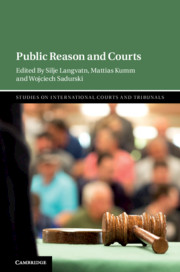Book contents
- Public Reason and Courts
- Studies on International Courts and Tribunals
- Public Reason and Courts
- Copyright page
- Contents
- Contributors
- Preface
- Acknowledgments
- 1 Taking Public Reason to Court: Understanding References to Public Reason in Discussions about Courts and Adjudication
- Part I Public Reason in Constitutional Courts
- Part II Public Reason in International Courts and Tribunals
- Part III Critical Perspective on Public Reason in Courts
- Index
1 - Taking Public Reason to Court: Understanding References to Public Reason in Discussions about Courts and Adjudication
Published online by Cambridge University Press: 22 May 2020
- Public Reason and Courts
- Studies on International Courts and Tribunals
- Public Reason and Courts
- Copyright page
- Contents
- Contributors
- Preface
- Acknowledgments
- 1 Taking Public Reason to Court: Understanding References to Public Reason in Discussions about Courts and Adjudication
- Part I Public Reason in Constitutional Courts
- Part II Public Reason in International Courts and Tribunals
- Part III Critical Perspective on Public Reason in Courts
- Index
Summary
What does it mean to take a “public reason approach to courts”? Public reason conceptions come in a wide range of varieties, but such conceptions do not necessarily translate into a specific jurisprudence. This chapter attempts to outline the main ways in which philosophical conceptions of public reason and jurisprudential approaches tend to correlate in the current literature. It characterizes the public reason approach to courts in an inclusive way, subsuming authors who accept (1) the general “idea of public reason” or the idea that legitimate legal and political impositions must be publicly justifiable and (2) an “ideal of public reason for courts” or the idea of public reason as conferring a duty on at least some courts, in some cases, to help secure the public justifiability some types of political and legal impositions. On this basis the chapter then identifies and characterizes six dominant public reason approaches to courts in the literature: “political liberal,” “liberal,” “classical liberal,” “deliberative,” “natural law,” and “public reason as justification vis-à-vis a broader audience.” The final sections discuss limitations and objections to the proposed taxonomy.
Keywords
- Type
- Chapter
- Information
- Public Reason and Courts , pp. 1 - 42Publisher: Cambridge University PressPrint publication year: 2020



